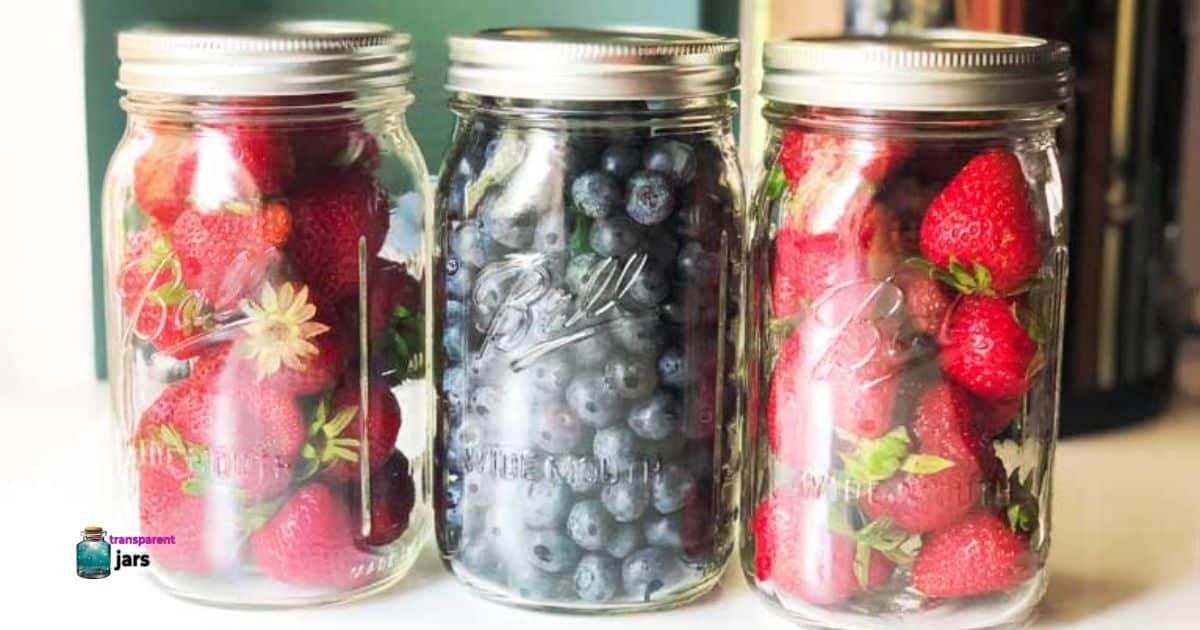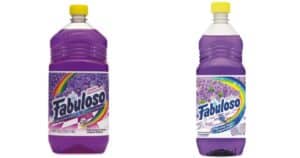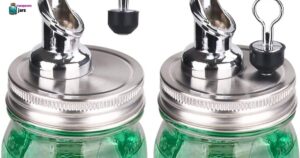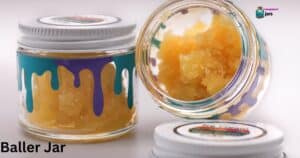Mason jars have long been a staple in kitchens for canning and preserving, but an interesting trend has emerged in recent years. Many people claim that storing fresh produce in Mason jars can extend its shelf life and keep it fresher for longer.
Is there any truth to this, or is it just another kitchen myth? In this article, we’ll explore the science behind food preservation, the properties of Mason jars, and whether they truly live up to the hype of keeping produce fresh.
Mason Jars Overview
Mason jars, named after John Landis Mason who patented them in 1858, were initially designed for canning and preserving. These glass jars come with a two-part metal lid – a flat disk that sits on top of the jar’s opening and a screw-on band to secure the lid in place.
The airtight seal created by the Mason jar is crucial for canning as it prevents the entry of air and microorganisms. This feature is what has sparked the idea of using Mason jars for storing fresh produce.
Basics Of Food Preservation
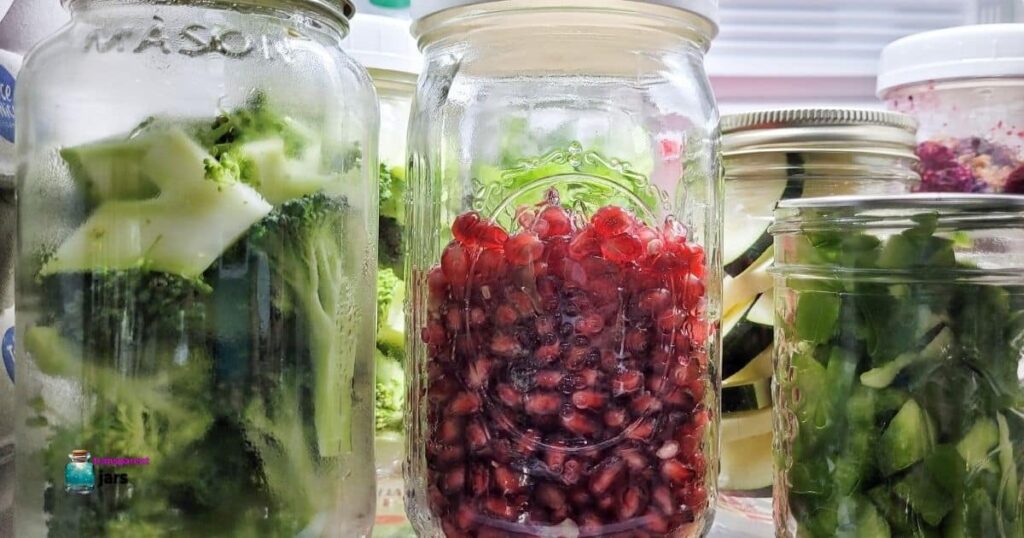
Before delving into the specifics of Mason jars, it’s essential to understand the basics of food preservation. The primary enemies of fresh produce are air, moisture, and microorganisms. When fruits and vegetables come into contact with these elements, they undergo chemical reactions that lead to decay and spoilage.
Common methods of food preservation include refrigeration, freezing, canning, and drying. Each of these techniques aims to create an environment that slows down the deterioration process, preserving the quality and nutritional content of the food.
How To Store Fruit In Mason Jars?
- Prepare The Fruit And Clean The Fruit
- Take fresh fruit out of its plastic containers or bags.
- Fill a bowl with fresh water or use a clean sink.
- Add two to three tablespoons of distilled vinegar to the water. This helps remove bacteria and extends the fruit’s freshness.
- Soak The Fruit:
- Place the fruit in the water and vinegar mixture.
- Let it soak for about fifteen minutes.
- Drain And Rinse:
- Remove the fruit and let any excess water drain.
- Rinse the fruit with fresh water to eliminate any remaining vinegar.
- Dry The Fruit:
- Allow the fruit to dry thoroughly. Use a strainer over the sink or place it on a paper towel to speed up the drying process.
- Optional: Cut The Fruit:
- If desired, cut the fruit into smaller pieces at this stage.
- Transfer To Mason Jars:
- Place the prepared fruit into clean Mason jars.
- Secure the jars tightly with their lids. No need for vacuum sealing in this method.
- Refrigerate And Enjoy:
- Place the Mason jars in the refrigerator.
- Now, you can enjoy fresh fruit whenever you like, whether as a healthy snack or a delightful addition to your meals.
Storing fruit in Mason jars creates a sealed environment that protects the fruit from air and contaminants, helping to preserve its freshness. This easy method, combined with proper cleaning and preparation, ensures your fruit stays tasty and ready to eat. Feel free to experiment with different fruits and jar sizes to find the perfect storage solution for your favorite snacks.
Do You Wash Fruit Before Storing In Mason Jars?
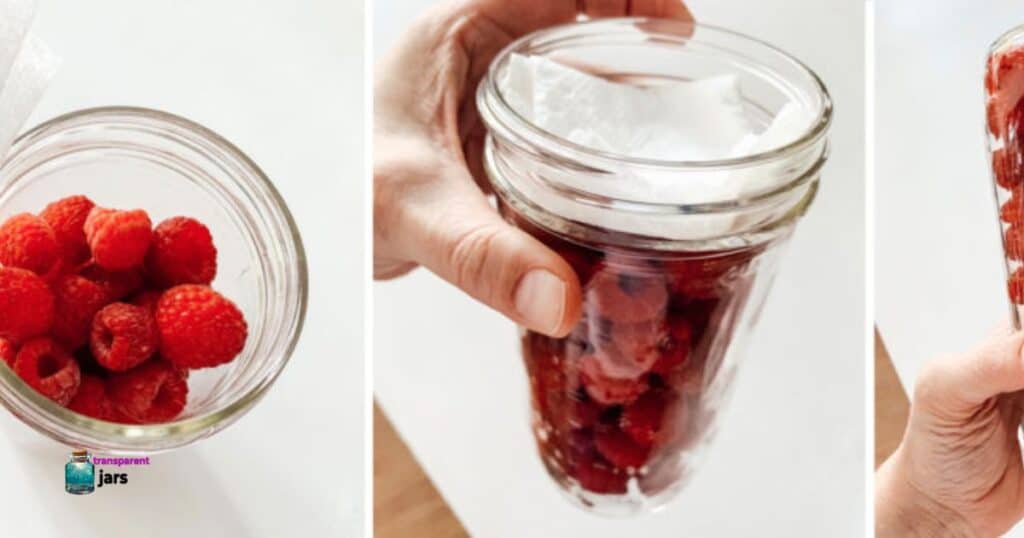
To keep fresh fruit lasting longer in Mason jars, it’s crucial to wash it with a mix of water and vinegar. Vinegar helps remove germs that make fruit go bad. If not washed, bacteria can spread, making the fruit spoil quickly. Before storing in a Mason jar, make sure the fruit is washed and dried properly.
If the jar gets wet inside, wipe it dry to keep the fruit fresh. Let the fruit dry completely before storing it, as moist fruit in the jar can decay faster. For the best results, ensure the fruit is dry and clean before putting it in the fridge, as fruit does well in low-humidity containers.
Will Food Last Longer In Mason Jars?
Storing fresh fruit and veggies in Mason jars can make them last longer, sometimes up to twice as much compared to plastic containers. However, it’s important to know that fruits and veggies are still perishable, meaning they can go bad quickly.
While washing and using jars can help keep them fresh, they won’t last a really long time. The time it takes for them to go bad depends on the type of fruit. For example, if strawberries last 2-3 days in plastic, they might last around a week in a Mason jar if prepared right. Just make sure to eat prepped fruit sooner to enjoy it before it goes bad!
The Airtight Seal And Fresh Produce
How The Seal Works
The airtight seal of Mason jars is created through a combination of the flat lid and the screw-on band. When the band is tightened, the lid presses against the jar’s rim, forming a hermetic seal. This seal is effective at keeping air and contaminants out, preventing oxidation and microbial growth.
Impact On Fresh Produce
When fresh produce is stored in a Mason jar with a proper seal, it’s shielded from the oxygen that would otherwise accelerate the deterioration process. Oxidation is a leading cause of browning in fruits and vegetables, and by minimizing exposure to air, Mason jars can potentially extend the freshness of produce.
Ideal Conditions For Fresh Produce Storage
While Mason jars can provide an effective barrier against air and contaminants, it’s essential to consider other factors that contribute to keeping produce fresh:
Temperature And Humidity
Mason jars alone are not a magic solution. Storing produce in a cool, dry place – like a refrigerator or root cellar – is crucial. Refrigeration slows down the enzymatic reactions responsible for ripening and decay. Mason jars can complement this by preventing moisture loss and maintaining a consistent environment.
Proper Preparation
Before sealing produce in Mason jars, proper preparation is vital. Washing and thoroughly drying fruits and vegetables before storage help remove excess moisture, reducing the risk of mold growth. Cut produce should be stored with care to minimize exposure to air.
Types Of Produce Suited For Mason Jar Storage
Not all fruits and vegetables are created equal when it comes to Mason jar storage. Some varieties are better suited for this method than others:
Berries
Berries, such as strawberries, blueberries, and raspberries, are well-suited for Mason jar storage. Their small size allows for easy packing, and the airtight seal helps prevent mold growth.
Leafy Greens
Leafy greens, like spinach and kale, can benefit from Mason jar storage when properly prepared. Removing excess moisture and tightly packing the leaves can extend their freshness.
Root Vegetables
Root vegetables, such as carrots and radishes, are excellent candidates for Mason jar storage. The airtight seal helps maintain their crispness and prevents dehydration.
Potential Drawbacks And Considerations
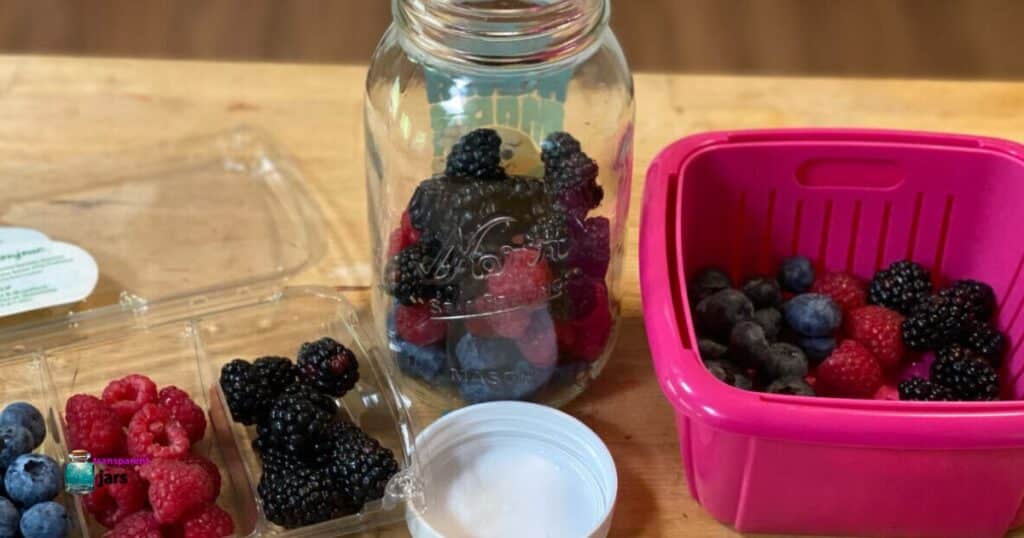
While Mason jars can be a useful tool for keeping produce fresh, it’s important to acknowledge their limitations:
Limited Capacity
Mason jars have a finite capacity, making them suitable for small quantities of produce. For larger quantities, alternative storage methods may be more practical.
Inconsistent Results
The effectiveness of Mason jars in keeping produce fresh can vary based on factors like the type of produce, storage conditions, and how well the jars are sealed. Results may not be consistent across all types of fruits and vegetables.
FAQ’s
How long will food last in a Mason jar?
Sealed and stored right, canned food in Mason jars lasts 12 to 18 months. Over time, its quality declines.
Should you store berries in mason jars?
Use plastic containers to wash berries, then transfer them to sealed glass jars. This slows down oxidation, keeping the fruit from molding too quickly in storage.
Do mason jars keep dry food fresh?
I love using Mason jars to store dry goods like nuts and spices. The jars keep them fresh and look great on the shelf.
Conclusion
So, in simple terms, Mason jars help keep fruits and veggies fresh for a longer time. The tight seal they make stops air and germs from making them go bad quickly. But remember, Mason jars aren’t a fix for everything. You also need to keep fruits and veggies in the right place, not too hot or wet, and prepare them properly to keep them fresh.
It’s important to always check your stored food for spoilage. Mason jars are great for keeping food fresh, but they work best when you use them along with other ways to keep food good. So, when you use a Mason jar to store your fresh food, remember that it’s an old and helpful way with its own good things and things to think about.

